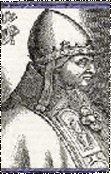| |

|
|

| |
1
OF 2 |
 |
The Crusades
 The
success of the Seljuk Turks stimulated a response from Latin Europe
in the form of the First Crusade. A counteroffensive launched in
1097 by the Byzantine emperor with the aid of the first Russian
state. Without pausing, the Mongols subdued the principalities of
Galicia and Volhynia and broke through to Hungary, Wallachia, Poland
and Silesia. Fully aware of the danger, Pope Gregory IX appealed
to all Christian people to form an alliance against this "new
Attila". The
success of the Seljuk Turks stimulated a response from Latin Europe
in the form of the First Crusade. A counteroffensive launched in
1097 by the Byzantine emperor with the aid of the first Russian
state. Without pausing, the Mongols subdued the principalities of
Galicia and Volhynia and broke through to Hungary, Wallachia, Poland
and Silesia. Fully aware of the danger, Pope Gregory IX appealed
to all Christian people to form an alliance against this "new
Attila".
The period of the Crusades began, armed expeditions
from Western Europe with the aims of freeing the Holy Places from
the incursions of the Muslims and of keeping open the pilgrimage
routes to the Holy Sepulchre. After varied fortunes and the foundation
of a Frauk Kingdom of Jerusalem, the Crusades ended by effecting
the reverse of what their spiritual fathers had had in mind: Saladin
conquered Jerusalem in October 1187. This calamity for Christianity
gave rise to the Third Crusade. This time the Crusader armies under
the command of Frederick I Barbarossa, Philip II Augustus and Richard
Coeur de Lion went overland to Palestine. Barbarossa, detained by
the Seljuks, besieged Iconium. It was the first direct confrontation
of Christians and Turks. Like Alexander the Great on the way to
Babylon, Barbarossa thought that he was dealing with savages and
barbarians. To his great astonishment he was to discover a city
adorned with marvellous buildings, which was far more sophisticated
than most European cities! Barbarossa took the city and reduced
it to rubble, but was not able to capture the citadel. He finally
gave up the attempt, continued on his march to Palestine and drowned
(in 1190) in the Kalykadmus (Saleph).
His march had altered nothing: Iconium rose
again from the ruins to devote itself to art and science. The Empire
of Rum reached its acme under Sultan Allauddin Kaikobad I (1220-1237).
The main contributions of Seljuk culture to Turkish history were
the introduction of Arab cursive writing (to replace the Kufic calligraphy
in use until then) and of Arab-Persian culture.
| |
1
OF 2 |
 |
|
|


